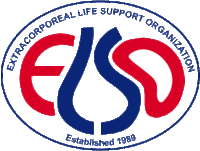Extracorporeal Life Support Organization
 | |
| non-profit organization | |
| Industry | Health care |
| Founded | 1989 |
| Headquarters | Ann Arbor, MI, United States |
| Website | http://www.elso.org/ |
The Extracorporeal Life Support Organization (ELSO) is a non profit organization established in 1989 supporting health care professionals and scientists who are involved in extracorporeal membrane oxygenation (ECMO).[1] ELSO maintains a registry of both facilities and specialists trained to provide ECMO services. ELSO also maintains registry information that is used to support clinical research, support regulatory agencies, and support individual ELSO centers. ELSO provides educational programs for active centers as well as for facilities who may be involved in the transfer of patients to higher levels of care.[2]
ELSO Chapters
In addition to the North American-based ELSO organization, chapters have been developed to represent the regional needs of ELSO in the rest of the world. Current chapters[3] include:
- Euro-ELSO - Founded in 2011 to serve the European region. Dr. Roberto Lorusso is the current chairman.
- Asia-Pacific ELSO - Founded in 2012 to serve the Asian and Pan-Pacific region. Dr. Graeme MacLaren is the current chairman.
- Latin American ELSO - Founded in 2012 to serve the Central and South American region. Dr. Luis Caneo is the current chairman.
- South and West Asia ELSO[4] - Founded in 2013 to serve the Southern and Western Asian region. Dr. Suneel Pooboni is the current chairman.
Recommended ECMO specialists
- Respiratory therapist holding a certificate as a Registered Respiratory Therapist
- Registered nurse with at least one year of intensive care unit experience.
- Clinical perfusionist graduating from a school of perfusion.
Guidelines for Care
ELSO promulgates guidelines[5] for the care of patients on ECMO. They include overall guidelines about setting up a program, proper equipment, and patient care for certain medical conditions. Additional education on ECMO topics is provided through ELSO published textbooks and training manuals for ECMO specialists.[6] ELSO recognizes centers with exceptional programs, systems, processes, and outcomes with the Award for Excellence in Life Support.[7]
Position Statements
ELSO provides position statements on:
- Organization of ECMO programs for acute respiratory failure in adult patients[8]
- Joint Statement on Mechanical Circulatory Support in Children: A Consensus Review from the Pediatric Cardiac Intensive Care Society and ELSO[9]
- Use of ECMO in Ebola virus disease[10]
References
- ↑ Cooper DS, Jacobs JP, Moore L, Stock A, Gaynor JW, Chancy T, et al. (2007). "Cardiac extracorporeal life support: state of the art in 2007.". Cardiol Young. 17 Suppl 2: 104–15. doi:10.1017/S1047951107001217. PMID 18039404.
- ↑ Kim K, Mazor RL, Rycus PT, Brogan TV (2011). "Use of venovenous extracorporeal life support in pediatric patients for cardiac indications: A review of the Extracorporeal Life Support Organization registry.". Pediatr Crit Care Med. 13 (3): 285–9. doi:10.1097/PCC.0b013e31822f1586. PMID 21926665.
- ↑ "Extracorporeal Life Support Organization - ECMO and ECLS > Members > Chapters". www.elso.org. Retrieved 2015-09-17.
- ↑ "South and West Asia chapter Elso | ECMO Society of India". www.swac-elso.com. Retrieved 2015-09-17.
- ↑ "Extracorporeal Life Support Organization - ECMO and ECLS > Resources > Guidelines". www.elso.org. Retrieved 2015-09-17.
- ↑ "Extracorporeal Life Support Organization - ECMO and ECLS > Publications". www.elso.org. Retrieved 2015-09-17.
- ↑ "Extracorporeal Life Support Organization - ECMO and ECLS > Excellence > Vision". www.elso.org. Retrieved 2015-09-17.
- ↑ Combes, Alain; Brodie, Daniel; Bartlett, Robert; Brochard, Laurent; Brower, Roy; Conrad, Steve; De Backer, Daniel; Fan, Eddy; Ferguson, Niall (2014-07-25). "Position Paper for the Organization of Extracorporeal Membrane Oxygenation Programs for Acute Respiratory Failure in Adult Patients". American Journal of Respiratory and Critical Care Medicine. 190 (5): 488–496. doi:10.1164/rccm.201404-0630CP. ISSN 1073-449X.
- ↑ MacLaren, Graeme; Dodge-Khatami, Ali; Dalton, Heidi J. (2013-01-01). "Joint Statement on Mechanical Circulatory Support in Children". Pediatric Critical Care Medicine. 14. doi:10.1097/pcc.0b013e318292dc09.
- ↑ "Extracorporeal Life Support Organization - ECMO and ECLS > Ebola Statement". www.elso.org. Retrieved 2015-09-17.